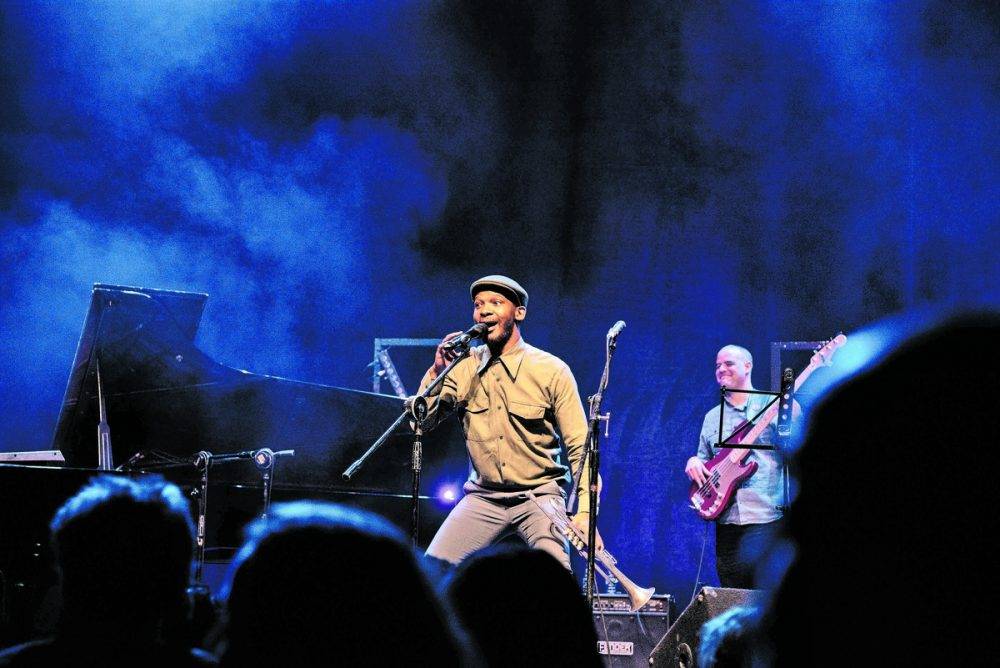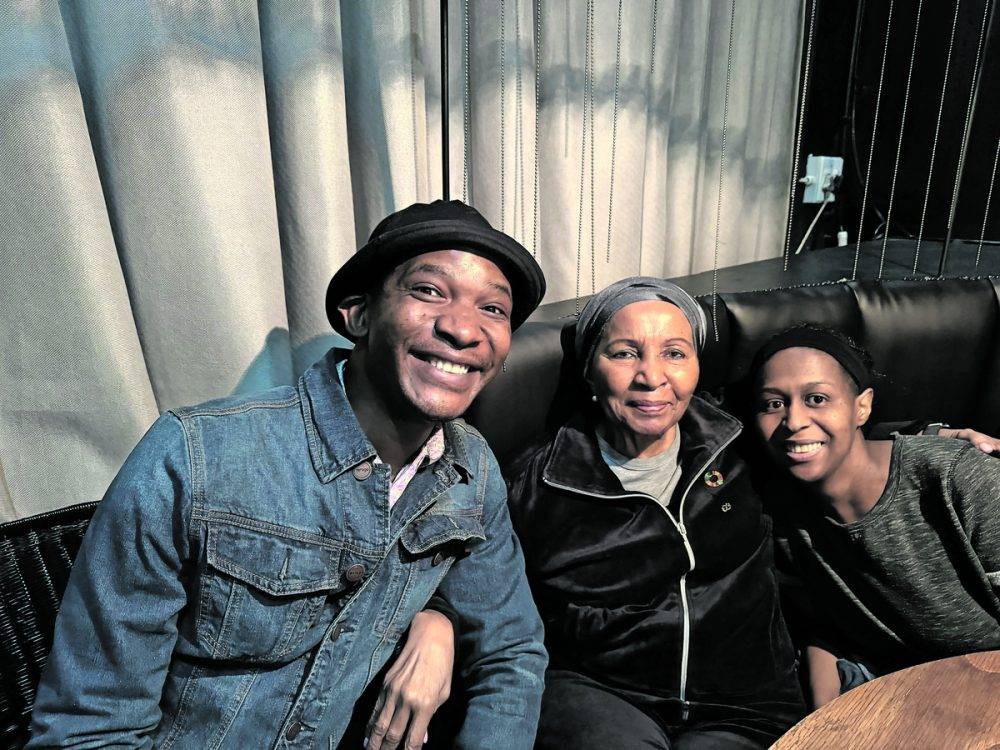Razzle-jazzle: Mandla Mlangeni’s band the TRC will launch their third album The Future Is Now at the UJ Weekend of Jazz. Photo: Supplied by the Tune Recreation Committee
Next Thursday evening award-winning trumpeter, composer and bandleader Mandla Mlangeni and his band the Tune Recreation Committee (TRC) will launch the University of Johannesburg’s Weekend of Jazz at the UJ Art Centre.
Not only will they be-jazzle fans with their adventurous music but will also launch their third album, The Future Is Now.
The TRC features drummer Joshua Klein, bassist Nicholas Williams and guest guitarist Vuma Levin.
Mlangeni has showcased his talent on numerous local and international stages, including a recent series of performances at Dizzy’s Jazz Club in New York with prominent musicians such as Mark Whitfield, Ronnie Burrage, Lonnie Plaxico, Jay Rodriguez and Lovell Bradford.
In addition to TRC, he leads various projects, including the Amandla Freedom Ensemble and the Swiss-based Birdsong Ensemble.
The Mail & Guardian spoke to Mlangeni.
What can we expect from your show at the UJ Weekend of Jazz?
The TRC will be launching their third album, aptly titled The Future Is Now. It represents a new direction for the sound of the ensemble, as we create a canvas on which musical ideas are expressed freely and honestly, while drawing inspiration from a myriad of influences and showcase the evolution of the members’ own compositional styles.
Audiences can expect an evening of head-bopping music that represents the full spectrum of the South African musical landscape.
Your thought-provoking music has always been more than just giving listeners a “good time”. How can music change the world?
Music continues to be a powerful tool for social change and grassroots mobilisation. As was evidenced with our country’s history, many musicians such as Miriam Makeba and Hugh Masekela rallied the world against the injustice of apartheid through their music. Their songs continue to this day to inspire and mobilise us to fight social injustices.
More than anything, music is a multifaceted tool with a myriad of benefits for society, other than just enjoyment. It is beneficial for the relief of stress, is a vehicle used to educate and bring awareness of society’s ills and a vehicle through which our cultures and stories can be shared. Music is life and reminds us who we are.
Can instrumental jazz be political?
Jazz is the triumph of the human soul and represents the length and breadth of human experiences. Even without words, emotions and ideas conveyed through instrumental jazz can resonate deeply and provoke thought and action.
From its earliest roots and conception by African-American communities, the music and what it embodies emerged during times of significant social and political upheaval.
The very act of creating and performing jazz was a form of resistance against racial oppression and segregation. The act of improvisation and the freedom the music offers you is in itself a political statement against conformity and authoritarianism.
Jazz, more than anything, has been adopted by us South Africans as a form of expressing our cultural identity and pride.
Musicians such as Winston Mankunku Ngozi, Phillip Thabane, Miriam Makeba, Themba Mkhize and many others used this music to celebrate our culture and heritage.
Let us not forget Mankunku’s now seminal composition Yakhal’iNkomo carries the political connotation of breaking free from the yoke of oppression, of young men sent to die in mines and wars that they have nothing to do with.

 Generations: Mandla Mlangeni on stage (left) and with ex-president Thabo Mbeki’s wife Zanele and her grandniece Ntsika Buthelezi (right). Photo (left): Tune Recreation Committee
Generations: Mandla Mlangeni on stage (left) and with ex-president Thabo Mbeki’s wife Zanele and her grandniece Ntsika Buthelezi (right). Photo (left): Tune Recreation Committee
Why did you choose the trumpet?
I didn’t choose the trumpet, it chose me. I always wanted to play the saxophone. It was fate that brought us together. My music teacher at the time, Mr Innocent Ngwane, saw how frustrated I was seeing the other students progressing to “real” instruments, while I was stuck playing the recorder.
He told me there was a trumpet in the boot of his car and should try my hand at it. My initial thought was that it was going to be an easy instrument that I would master in no time as it only had three buttons.
Little did I know that it would continue to kick my butt to this very day!
Chuck Berry’s guitar was called Maybelline and BB King’s was Lucille. Has your trumpet got a nickname?
I have just recently acquired a new trumpet on my last trip to the US. It’s a gold-plated Antoine Courtois medium bore. So I have not had time to ponder on what I should name it. But now that you mention it, her name is Goldie.
Other than the musicians you have been playing with in TRC, the Birdsong Ensemble and the Amandla Freedom Ensemble, who are your fantasy collaborators?
I dream of sharing the stage with Wynton Marsalis and the Jazz At Lincoln Orchestra. It is a fantasy of mine to have them perform some of the music I have composed.
What’s the weirdest place or situation you’ve found inspiration for a song?
The weirdest situation I found inspiration for a song was in between the arms and legs of the woman I am with now. Every time we engage in the act of lovemaking, the rhythms of our movements are the musings of the next compositions.
Do jazz musicians also have groupies?
Of course we have tons of groupies that always show up to our shows, ask to take pics with and hang out backstage. It’s just that they are much older versions of ourselves. Nonetheless, we still relish the attention.
Who is your jazz style icon?
I have had several style icons through the years. I was drawn to the stylistics of Jean-Michel Basquiat and now, I think, the classic Miles Davis — the man of cool.
What are your get-ready rituals before you play a show?
A constant ritual before the show is to ensure that I am well fed so that when I get onstage I can properly gas out while blowing my horn.
How long do you stay stressed into a show?
It’s been a while since I have felt stressed before going on stage. It’s something that I look forward to doing and, on occasion, I do have butterflies in my tummy but I always ensure that I am properly warmed up and on good vibes with my bandmates.
Who do you wish could be at Thursday night’s performance but who can’t be there?
My one wish would be to have my dearly departed Granma and my late dad Bheki in attendance. Every so often I have visions of them attending my gigs in my dreams and them being my biggest cheerleaders.
What’s the most memorable fan encounter you’ve had during a performance?
It has to be this past Sunday’s listening session at the Untitled Basement. uMam’Zanele Mbeki was in attendance and she mentioned she liked the way I played trumpet after seeing me on TV … and right there and then decided to come to see me in action. That was truly heartwarming.
What prompts an encore? Audience response?
Most of the time we are well prepared for the encore and know exactly what will keep the audience asking for more.
What is your favourite Saturday night song?
I am jamming to Sunset Rollercoaster, a Taiwanese five-piece, jazz-inspired, synth-pop band. My favourite tune on the album, which is on high rotation, is called My Jinji.
And your favourite Sunday morning song?
Charles Mingus’ The Black Saint and the Sinner Lady. I play that record until I receive complaints from the neighbours.
What made you get up this morning?
I was woken up by the blaring sound of the electricity meter reminding me to load more units.
When last did you cry and why?
I last cried quite deeply on 15 February 2021 during the broadcast of the Zondo Commission of Inquiry into State Capture.
It was exactly 30 years to the day my father [the human rights lawyer Bheki Mlangeni] passed away from a booby-trapped Walkman sent by Eugene de Kock disguised as evidence for a case he was working on.
I heard testimony on how the State Security Agency was funding the lifestyle of my father’s killer, De Kock. I felt a sense of great betrayal and injustice. The very movement my father fought valiantly for was in bed with the enemy.
Since then there have been a series of rude awakenings.
And what made you laugh until you cried?
These days, all I need to do is switch on Instagram reels and will be guaranteed of laughing till I cry.
Songwriter and jazz vocalist Gabi Motuba will perform on Friday 30 August, and pianist and composer Keenan Meyer on 31 August.